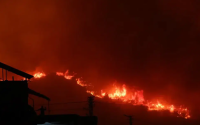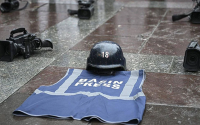9 August 2004Lawrence J. Korb
Nuclear proliferation
While unexpected, the decision by the Bush administration last month to oppose inspections and verification as part of the Fissile Materials Cutoff Treaty is not surprising. Since taking office, the administration has taken a number of steps that have undermined the ability of the United States and the world community to curb the proliferation of nuclear weapons.But given the fact that Bush agrees with most analysts that the greatest danger facing the United States is a nuclear weapon falling into the hands of a rogue state or terrorist group, his actions are counterproductive and defy good sense.The fissile materials cutoff would ban the production of enriched uranium and plutonium, the two ingredients used for setting off a chain reaction nuclear explosion. It was designed to reinforce the Nuclear Nonproliferation Treaty and impose restraints on the three nuclear powers which are not parties to that treaty.By refusing to establish an inspection regime for the fissile materials cutoff, the Bush administration has thwarted a 10-year effort by the international community to lure Pakistan, India and Israel into accepting some oversight of their nuclear production programs.The Nonproliferation Treaty strikes a grand bargain among the five declared nuclear powers and the rest of the world that the non-nuclear states will not develop nuclear weapons, in return for which the nuclear powers will reduce and eventually eliminate their own nuclear weapons.Since coming into office, the Bush administration has undermined this reciprocal arrangement in a variety of ways, despite the fact that it could make America safer and more secure.First, instead of eliminating nuclear weapons, the Bush administration is seeking funds to develop two new nuclear weapons, a low yield "mini-nuke" and a robust nuclear earth penetrator or "bunker buster." Second, because the development of these new weapons will require testing, the administration has refused to submit the Comprehensive Test Ban Treaty to the Senate for ratification and has instead sought funds to ready the Nevada test site for future testing. In its proposed 2005 budget, the administration has requested $6.8 billion for conducting research and expanding U.S. nuclear capabilities.This is twice the amount the U.S. spent in this area a decade ago.Third, since these new nuclear weapons are in reality first-use weapons, the administration has revised its nuclear strategy. In its December 2001 Nuclear Posture Review, the administration made clear that it would be prepared to use nuclear weapons against non-nuclear states, including launching preemptive attacks with nuclear weapons against nations that were close to acquiring nuclear arsenals.This new strategy may well have led North Korea and Iran to accelerate their own nuclear programs.Fourth, while arguing that other nations cannot withdraw from the Nonproliferation Treaty, the Bush administration itself withdrew from the Anti-Ballistic Missile Treaty and has actually deployed a national missile defense system in Alaska. Although this system is designed to combat an intercontinental missile threat from North Korea, it has already provoked Russia to increase its nuclear capabilities and may well provoke China to do the same.In addition to undermining the Nonproliferation Treaty, the Bush administration has weakened America's own nonproliferation efforts. For example, it has decreased funding for the Nunn-Lugar Cooperative Threat Reduction initiative that has deactivated more than 6,000 nuclear warheads in the former Soviet Union.Moreover, while the administration signed a Strategic Offensive Reductions Treaty with Russia that commits both sides to reduce the number of operationally deployed nuclear weapons to between 1,700 and 2, 000 by Dec. 30, 2012, it plans to keep another 3,000 nuclear weapons in storage, refuses to include new verification mechanisms in the treaty, and has not agreed to compliance beyond 2012.Preventing Iraq from acquiring nuclear weapons or passing them on to a terrorist group like Al Qaeda was a primary justification for a war that has caused thousands of American casualties and cost the American taxpayer hundreds of billions of dollars.Yet in its approach to nonproliferation, the administration is doing things that increase the dangers of nuclear weapons falling into the wrong hands.Lawrence J. Korb is a senior fellow at the Center for American Progress. He also served as assistant secretary of defense in the Reagan administration.






